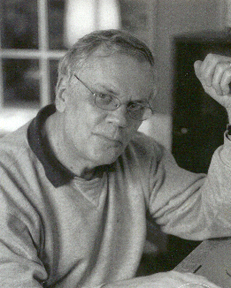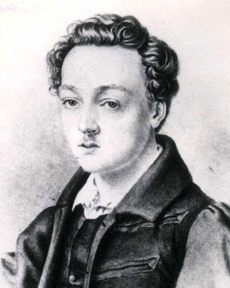Dramaturgical Resources
2009
Danton's Death
By Georg Buchner
Over the course of the season, our assistant directors and student dramaturgs will be compiling dramaturgical resources relating to each production as it develops. Below are some links to websites which relate to the history of the play, the biography of the playwright, and sites that contextualize and, we hope, shed light on the directorial approach to the dramatic material.
We hope you find these resources of interest.
Georg Buchner (1813-1837)

Robert Auletta (b. 1940)
The Playwright
Georg Büchner was born into a medical family and initially intended to be a scientist, not a playwright. His specialty was anatomy.
Danton’s Death was Büchner’s first play. He wrote it in 1835, at a time when he was under suspicion by the government of the German Confederation for writing an anonymously authored subversive pamphlet.
His other works include the plays Leonce and Lena, Woyzek, and the short story Lenz (here's an analysis of the work focusing on the schizophrenia of Lenz).
Here are some excerpts from some of Büchner’s letters. (link available to the UR community only)
The Play
The play focuses on the Reign of Terror during the French Revolution. It looks at the swift change that occurred between the August 10th movement of 1792 (here is an account of events by the Marquis de Condorcet) which was led by the revolutionary, George Danton and the Terror of the following years that involved huge numbers of public executions.
The play takes place from March 24 to April 4, 1794. During this time, Maximilien Robespierre was in charge of the Committee of Public Safety that, along with the Revolutionary Tribunal, condemned people to the guillotine. Guillotine victims ranged from those who were seen as too radical to those who were viewed as royalist sympathizers or even simply moderates (like Danton).
The Themes
Büchner makes reference to a number of ancient philosophers, and expresses the ideas of a later existential philosophy in some of Danton’s monologues. Many critics have noted the influence of Shakespeare in Danton’s Death, especially the plays Hamlet, King Lear, and Macbeth.
During Büchner’s life, Shakespeare’s works had a marked influence on German literature, especially because of the German philospher and writer Gotthold Ephraim Lessing. Lessing had been one of the first dramatists in Germany to seriously look at Shakespeare’s work. His consideration of Shakespeare popularized Shakespeare in Germany, and may have shaped the styles of later German writers (including Büchner).
Büchner was also a part of the “Young Germany” movement, meaning his writing reflected the social and political issues of his time. For more on this movement see Young Germany: A History of the German Youth Movement.
For a look at the rest of the German Romantic movement, see this.
His work has also been said to be slightly influenced by the German “Sturm und Drang” movement that came before him, as well as a forerunner to the Theatre of the Absurd movement that came much later, but which was also very connected to existential philosophy.
Here's a short history of movements in German literature.
For an essay on the play as a representation of the theatricality of politics, culture and law, read this.
The Reviews
Here's a detailed review of the play by Lee Baxandall...
...and a review by the New York Times of the Classic Stage Company’s production (1983).
For a look at the film Danton on the same subject as the play, see here.
The Adapter/Translator
Robert Auletta is a well-known playwright and translator. The first production of his adaptation of Danton’s Death occurred at the Alley Theatre in Houston, Texas, in 1992, and was directed by Robert Wilson, a noted American director.
Praise for his adaptation.
Some of his other plays include: Blue Maragaritas, Diesel Moon, Guess Work, Hage—The Sexual History and a version of Sophocles’ Ajax. (For a full list, click here.)

